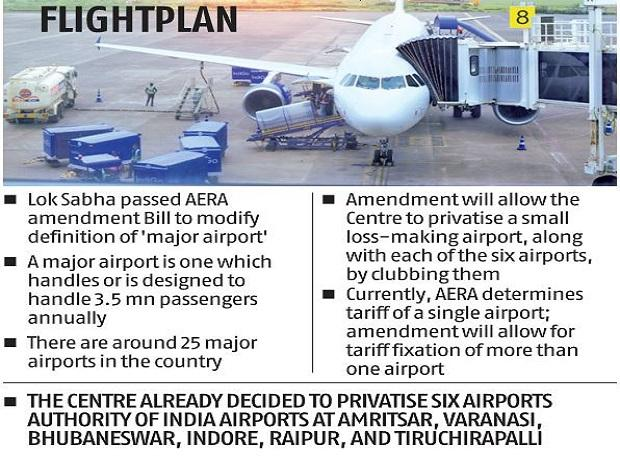Indian Economy
AERA Amendment Bill, 2021
- 30 Jul 2021
- 4 min read
Why in News
Recently, the Lok Sabha passed the Airports Economic Regulatory Authority of India (AERA) Amendment Bill, 2021.
- It was first introduced in March 2021 and subsequently referred to a parliamentary standing committee on transport, tourism and culture, which approved it without any changes.
- It seeks to amend the Airports Economic Regulatory Authority of India Act, 2008.
Key Points
- Major Provisions:
- Definition:
- It proposes to amend the definition of major airport to include a group of airports.
- The 2008 Act designates an airport as a major airport if it has an annual passenger traffic of at least 35 lakh.
- The central government may also designate any airport as a major airport by a notification.
- It proposes to amend the definition of major airport to include a group of airports.
- Tariff:
- It will allow AERA to regulate tariff and other charges for aeronautical services for not just major airports with annual passenger traffic of more than 35 lakh, but also a group of airports.
- Profitable Clubbing:
- The government will be able to club profitable and non-profitable airports as a combination/package to bidders to make it a viable combination for investment under PPP (Public-Private Partnership) mode.
- Definition:
- Significance:
- It will help in expanding the air connectivity to relatively remote areas and as a result, expediting the UDAN regional connectivity scheme.
- It will encourage development of smaller airports.
- Concern:
- Lack of clarity in the bill on the criterion for deciding which airports will be clubbed together to qualify under ‘a group of airports’ definition, whether it will be the passenger traffic of more than 3.5 million or some other factors too.
Airports Economic Regulatory Authority of India
- Background:
- Initially, the Airports Authority of India (AAI) was running and managing the airports. After some time, a change was made in the civil aviation policy as some private players were also given airports to run. The reason behind this was to provide consumers with great services.
- Typically, airports run the risk of becoming a monopoly because cities usually have one civilian airport which controls all aeronautical services in that area.
- To ensure that private airport operators do not misuse their monopoly, the need for an independent tariff regulator in the airport sector was felt.
- About:
- The Airports Economic Regulatory Authority of India Act, 2008 (AERA Act) was passed which set up the AERA as a statutory body.
- It was set up, keeping in mind that the country needs to have an independent regulator who has transparent rules and can take care of the interests of the service providers as well as that of the consumers.
- Functions:
- The AERA regulates tariffs and other charges (development fee and passenger service fee) for aeronautical services (air traffic management, landing and parking of aircraft, ground handling services) at major airports.







